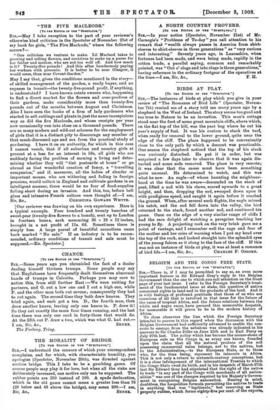"THE FIVE MACLEODS."
[To THE EDITOR OW THE "SPZOTAT011.1
Sin,—May I take exception to the part of your reviewer's otherwise kind criticism in the Spectator of November 21st of my book for girls, "The Five Macleods," where the following
occurs?— "One criticism we venture to make. Lil Macleod takes to growing and selling flowers, and contrives to make up a purse for her father and mother, who are not too well off. And how much is it ? Twenty-five pounds ! And this after handsomely paying her workers with presents. It is better to be near Glasgow, it would seem, than near Covent Garden."
May I say that, given the conditions mentioned in the story— of skilled management of the garden, a ready buyer, and no
expense in transit—the twenty-five-pound profit, if anything, is understated ? I have known estate owners who, happening to find a direct market for the flowers and over-produce of their gardens, make considerably more than twenty-five pounds out of the months between August and Christmas.
Also I have seen the books of a firm of lady gardeners who started to sell cuttings and plants in just the same inauspicious way as did the five Macleods, and whose receipts per year now occasionally run into close on a thousand pounds. There are so many modern and wild-cat schemes for the employment of girls that it is a distinct pity to discourage any member of that much-discussed age and sex from the practical study of gardening. I have it on an authority, for which in this case I cannot vouch, that if all suburban and country girls at present at a loss for an interest in life, all girls who ale suddenly facing the problem of earning a living and deter- mining whether they will "tint postcards at home" or go abroad as that wonderful creation of fancy, a "travelling companion," and if, moreover, all the ladies of slender or important means, who are withering and fading in foreign pensions, would collect in England and cultivate gardens in an intelligent manner, there would be no fear of food-supplies falling abort during an invasion. And this, too, before bell glass and intensive French culture were thought of.—I am,
Sir, &c., CHRISTINA GOWANS WHYTE.
[Our reviewer was drawing on his own experience. Here is a typical example. Four hundred and twenty bunches of sweet-pear (twenty-five flowers to a bunch), sent up to London
in fourteen boxes, each measuring 36 x 18 x 12 inches, brought in a net profit of us. 6d. Sometimes there is simply loss. A large parcel of beautiful carnations came back marked "No sale." If an industry is to be recom- mended, ordinary conditions of transit and sale must be supposed.—En. Spectator.]






































































 Previous page
Previous page